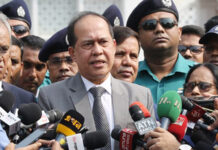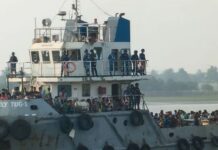CrisisWatch
Tracking Conflict Worldwide
Global Overview
Outlook for This MonthJanuary 2019
Conflict Risk Alerts
Resolution Opportunities
Trends for Last MonthDecember 2018
Deteriorated Situations
BurundiDemocratic Republic of CongoSudanNigeriaTogoBangladeshIndonesiaNicaraguaSyriaLibya
In December, deadly clashes punctuated the weeks leading up to general elections in both DR Congo and Bangladesh, and disputes over the results could trigger more bloodshed in January. Nigeria suffered a high rate of insurgent attacks and a rise in violent crime in its northern regions ahead of elections in February-March. In Sudan and Togo, security forces clamped down on anti-government protests, and Burundi further isolated itself from its neighbours. In Nicaragua, the political situation remained tense amid growing government attacks on NGOs and journalists, and in Indonesia, a West Papua pro-independence armed group launched a deadly attack in Papua. In Yemen, a ceasefire agreement offered a glimmer of hope; new UN-led talks in January could lead to wider de-escalation, but if they fail the battle for Hodeida could resume. President Trump’s announcement that the U.S. would withdraw its troops from Syria upset a fragile balance of forces in the north east, and in Libya, tensions rose after ISIS attacked the foreign ministry. Sri Lanka’s President Sirisena reappointed the deposed Prime Minister Wickremesinghe, signalling an end to the constitutional and political crisis that had shaken the country.
Trends and Outlook
At long last, DR Congo went to the polls. Voting day itself – delayed for another week till 30 December – was mostly calm. But the preceding weeks saw violence mount, with opposition supporters clashing with security forces or partisans of the ruling coalition. The risk of violence will be high in coming weeks, as losers may dispute results. In particular, the electoral commission’s decision to postpone voting in some areas afflicted by Ebola and ethnic violence until March, after a new president has taken office, disenfranchises 1.25 million potential voters, many opposition supporters. We have warned it’s a dangerous move. The electoral commission should reverse its decision and organise voting in the affected areas after a week or two at most to ensure those votes count.
Resurgent violence in northern Nigeria, among other factors, makes conditions for general elections in February and March particularly combustible. While Boko Haram kept up a high tempo of attacks against civilians and military in the north east, criminal violence accelerated in Zamfara state in the north west, where bandit attacks left at least 97 dead. Burundi marched ahead on its isolationist trajectory, with the national assembly rejecting the African Union’s calls for political restraint and relations deteriorating with both Uganda and Rwanda.
Sudan’s prolonged economic crisis fuelled a new wave of protests, to which security forces responded with force, reportedly leaving dozens dead. The protests and their political fallout could amount to a serious challenge to President Bashir’s rule – which in turn could stir further instability in South Sudan. In Togo, too, security forces clamped down on protests in the run-up to legislative polls, boycotted by the opposition. The death of at least four protesters could make resolving the standoff between the government and opposition even harder.
As we had warned, violence between supporters of rival political parties ahead of and on the day of Bangladesh’s general elections left hundreds injured and dozens killed. The opposition claimed the election commission was biased, and accused security forces of being complicit in attacks on their leaders and supporters – a charge denied by the ruling Awami League. With the opposition now rejecting the ruling coalition’s landslide victory, claiming widespread fraud, we fear more violence.
Fighting spiked in Indonesia, where the West Papua National Liberation Army claimed responsibility for killing at least seventeen state contractor employees working on a major highway construction project in Nduga district, Papua province, on 2 December. More people were killed and hundreds of civilians reportedly fled as the military launched a hunt for the suspects. The attack came a day after police arrested hundreds of people taking part in demonstrations marking the 57th anniversary of West Papua’s declaration of independence.
The political situation remains tense in Nicaragua, where President Ortega’s government displayed increasingly repressive tendencies, targeting human rights NGOs, journalists and members of the opposition. The Inter-American Commission on Human Rights concluded the government had installed a “regime of terror”. To prevent more unrest, we have called on outside powers, especially from Latin America, the U.S., EU and Vatican, to press Ortega to implement agreed electoral reforms and ensure due process for arrested protesters.
After multiple false starts, UN-led negotiations between Yemen’s warring parties concluded with a ceasefire in Hodeida governorate, which could open the way to wider de-escalation in January and a negotiated end to the conflict in 2019. But if the talks fail or implementation falters, rival forces could resume the battle for Hodeida port and city with catastrophic humanitarian implications.
U.S. President Trump’s decision to pull his forces from Syria put that conflict firmly on our list of conflicts to watch in 2019. The announcement upset the delicate balance of forces and, further down the line, raises the odds of a bloody conflict involving Turkey, its Syrian allies, Syrian Kurds, and the Assad regime; and potentially gives the Islamic State a new lease on life by fuelling the chaos on which it thrives. Meanwhile, in Libya, Islamic State’s attack on the foreign ministry in Tripoli underscored the hazardous security environment hampering reunification of rival state institutions.
Sri Lanka’s constitutional and political crisis ended as President Sirisena reappointed deposed Prime Minister Wickremesinghe to office, bowing to two Supreme Court rulings blocking his attempt to install former President Rajapaksa as prime minister and call early general elections. While fearing the political blockages that led to the attempted constitutional coup remain in place, observers hailed Wickremesinghe’s re-appointment as a victory for the rule of law and parliamentary democracy.










